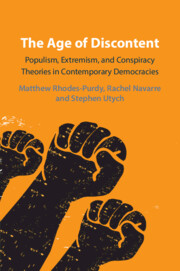Book contents
- The Age of Discontent
- The Age of Discontent
- Copyright page
- Dedication
- Contents
- Figures
- Tables
- Acknowledgements
- Abbreviations
- 1 Introduction
- 2 Left Behind vs. Backlash
- 3 Affective Political Economy
- 4 Affective Political Economy and Political Discontent
- 5 Frozen Parties, Failing Markets
- 6 Austerity, Regionalism, and Dueling Populisms in Spain
- 7 Corruption, Populism, and Contentious Politics in Brazil and Chile
- 8 The Dogs That Did Not Bark
- 9 Populism in Power
- 10 Conclusions
- References
- Index
8 - The Dogs That Did Not Bark
How Canada, Portugal, and Uruguay Avoided Discontent
Published online by Cambridge University Press: 02 March 2023
- The Age of Discontent
- The Age of Discontent
- Copyright page
- Dedication
- Contents
- Figures
- Tables
- Acknowledgements
- Abbreviations
- 1 Introduction
- 2 Left Behind vs. Backlash
- 3 Affective Political Economy
- 4 Affective Political Economy and Political Discontent
- 5 Frozen Parties, Failing Markets
- 6 Austerity, Regionalism, and Dueling Populisms in Spain
- 7 Corruption, Populism, and Contentious Politics in Brazil and Chile
- 8 The Dogs That Did Not Bark
- 9 Populism in Power
- 10 Conclusions
- References
- Index
Summary
This chapter turns to the comparison of cases. By analyzing the discontented cases, a clear pattern emerges. The positive cases share few characteristics save one: democratic discontent that arose when sharp economic contractions intensified the imperfections and contradictions of the political status quo. This argument is made using paired comparisons of the positive and negative cases (Canada with the USA/UK, Portugal with Spain, Uruguay with Brazil/Chile) to evaluate competing explanations. The second section of the chapter analyzes how discontent was avoided during the Great Recession by looking for shared features of the three negative cases. It finds that escaping the initial pain of a crisis was not a necessary condition for avoiding discontent. Instead, the key to maintaining democratic legitimacy lay in the political response to the crises, and in the adaptability and health of left-wing parties. In all three negative cases, center-left parties recognized crises as indictments of neoliberalism, rejected its calls for austerity. By responding to popular demands for help in difficult times, these parties deprived cultural conflicts of the oxygen needed for them to rage and avoided major upsurges of discontent.
Keywords
- Type
- Chapter
- Information
- The Age of DiscontentPopulism, Extremism, and Conspiracy Theories in Contemporary Democracies, pp. 180 - 204Publisher: Cambridge University PressPrint publication year: 2023



